Causes of Sharp left side pain or abdominal pain after gastric bypass
Abdominal pain or left side pain is something that you may experience after having gastric bypass surgery. It is estimated that more than 50% of postoperative complaints and emergency room visits following gastric bypass surgery are related to abdominal pain.
There are a variety of reasons why you might be experiencing abdominal pain or discomfort. This article will help you to differentiate between the various types of pain and help you to better understand the cause of pain or discomfort that you might be experiencing.
It is important to note that pain is subjective, meaning that not everyone will experience pain in the same way or to the same degree. This article will provide you with information on how to cope with the pain you might be experiencing and provide education on when you should speak with your bariatric surgeon about symptoms or pain that might indicate a severe complication.
Common causes of abdominal pain
A study published by The American Journal of Surgery evaluated the common causes of abdominal pain following gastric bypass.
Nutritional Causes
- Pain-related to overeating
- Food insensitivity
- Vitamin deficiencies
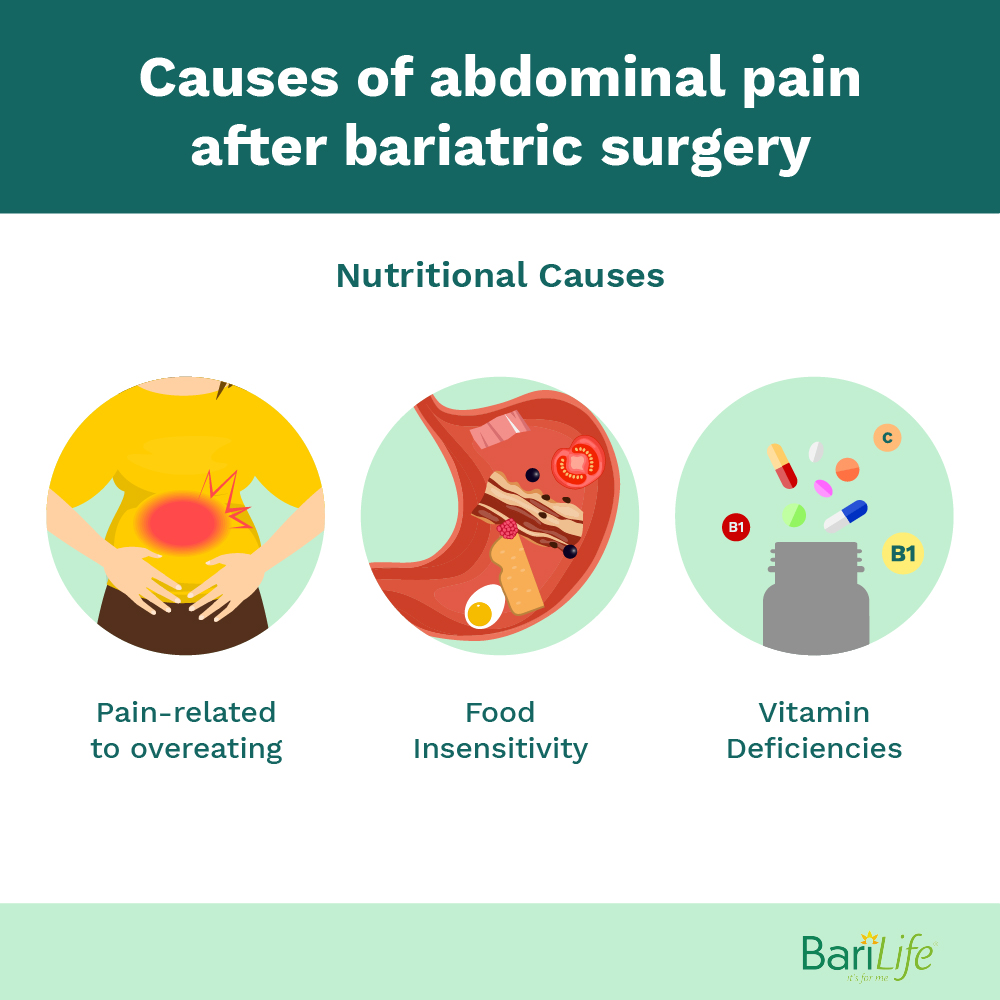
Initially following surgery it might be difficult to adjust or adapt your eating behaviors to fit your newly remodeled digestive system. Overeating or rapid eating following surgery may lead to stomach pain.
Gastric bypass alters your body’s ability to determine when you are full, meaning that you might not realize you are full until your stomach is stretched to the point of pain. It is common that the feeling of fullness can feel more like discomfort following gastric bypass.
This pain often occurs right below your ribs or in your upper abdomen following meals. It can be caused by both rapid eating or overeating. It is important to remember that your stomach is smaller following surgery so you need to eat slowly and in smaller portions.
Other nutritional causes of stomach pain can be related to vitamin deficiencies or food intolerances.. Food intolerances or sensitivities will vary from person to person. One study, published by The British Journal of Surgery, found that red meat and foods high in fat and/or sugar were the common culprits of food intolerances following gastric bypass.
It is important to think about what you ate prior to gastrointestinal symptoms or pain to try and pinpoint a food intolerance. If you feel you might be experiencing food intolerance or sensitivity, then you should work with a registered dietitian to help you determine the root cause and make the necessary adjustments in your diet.
Vitamin deficiencies such as Iron, Vitamin D, and Vitamin B12 have been shown to cause abdominal pain. Vitamin deficiencies can cause stomach pain because nutrient absorption is reduced following surgery. Adding supplements can aid in pain relief.
Functional Causes
- Constipation, diarrhea, flatus
- Irritable bowel syndrome (IBS)
- Esophageal motility disorders
- Dumping Syndrome
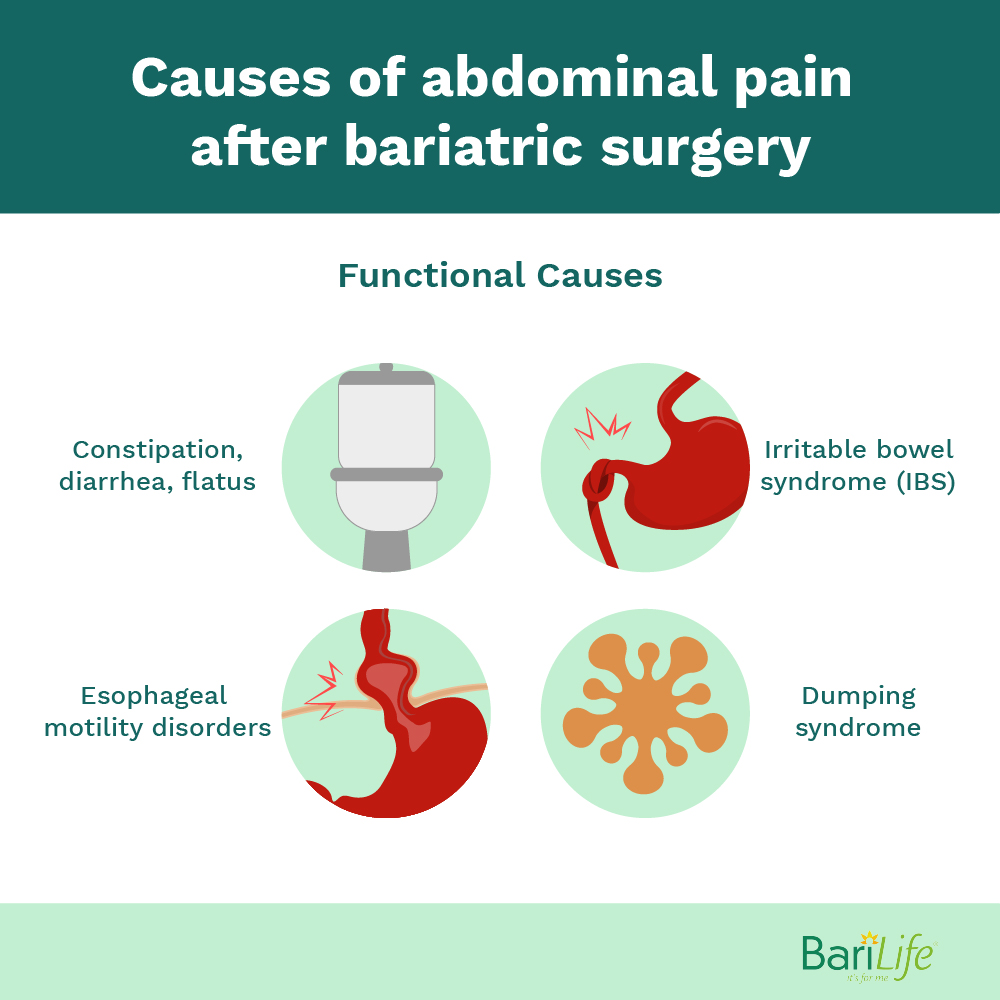
Pain related to constipation, diarrhea, and IBS usually presents as diffuse and crampy in the lower abdomen. Constipation is common early on following surgery and may be the result of dehydration. It is less common to experience diarrhea or flatus following surgery but if you do experience these symptoms they may also be associated with abdominal pain.
Obesity is a risk factor of IBS. It is important to note that symptoms of IBS may worsen after gastric bypass surgery and can result in abdominal pain.
Dumping syndrome is characterized by a variety of symptoms including nausea, dizziness, flushing, and tachycardia. Pain is generally not a dominant symptom but may be associated with bloating, cramping, and diarrhea. Dumping syndrome is often related to refined sugar intake and can be managed by diet and behavioral changes.
Gastrointestinal or Biliary Causes
- Ulcers
- Cholelithiasis
- Biliary colic
- Gastroesophageal Reflux Disease (GERD)
- Hernia
- Stenosis
- Fistula
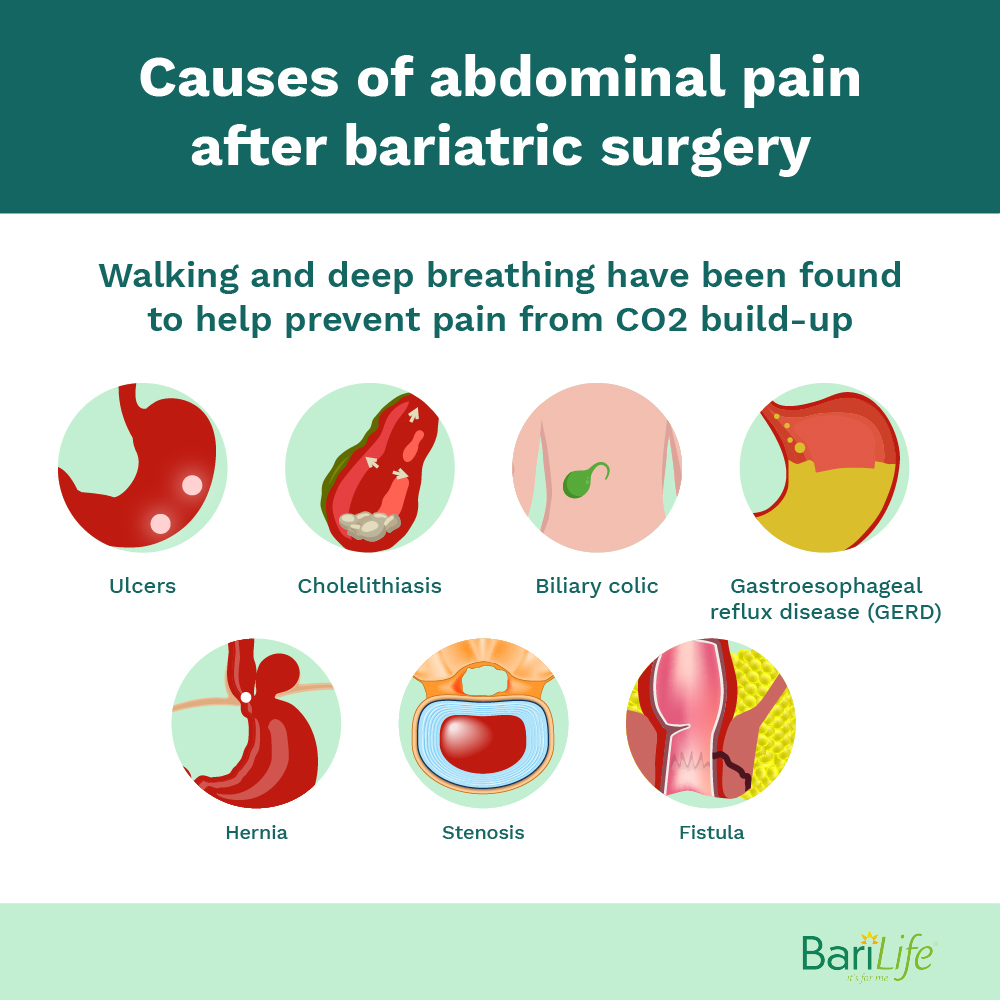
Biliary colic is a known cause of abdominal pain following gastric bypass. Colic refers to the type of pain that comes and goes. This pain usually occurs following a meal high in fat content.
One of the reasons for this is because extreme weight loss after bariatric surgery is suggested to be a risk factor for cholelithiasis, aka gallstones. Some studies suggest that the prevalence of cholelithiasis after bariatric surgery may exceed 40%.
Ulcer disease may occur at any point following gastric bypass, but it rarely presents with perforation. Pain is one of the most common symptoms. This pain is usually a burning pain that occurs in the epigastric region, or the central upper part of the abdomen, and occurs shortly after eating.
If you are experiencing pain that may indicate an ulcer you will need to visit your doctor to get a definitive diagnosis.
You may also feel a burning sensation or heartburn if you are experiencing acid reflux or GERD. A study published by The Canadian Journal of Surgery, suggests that some forms of gastric bypass may actually help to alleviate GERD while other forms of bariatric surgery like the gastric sleeve may increase the likelihood of GERD.
Post op pain
Two common causes of pain following gastric bypass include…
- Pain from incisions or the procedure itself
- Pain related to remaining carbon dioxide (CO2) in the abdomen following surgery
Surgery often involves making an incision below the ribs to staple the rerouted intestines. During this process stretching occurs that can result in bruising of muscles and damage to nerves which can cause horrible pain on the left side following surgery.
This pain is usually felt below the ribs and lasts for a few weeks after the procedure. This pain may be reduced or relieved by changes in posture.
CO2 is used to inflate the abdomen during surgery. This creates more space in the abdomen to perform the procedure. Following surgery, excess CO2 may remain in the abdominal cavity.
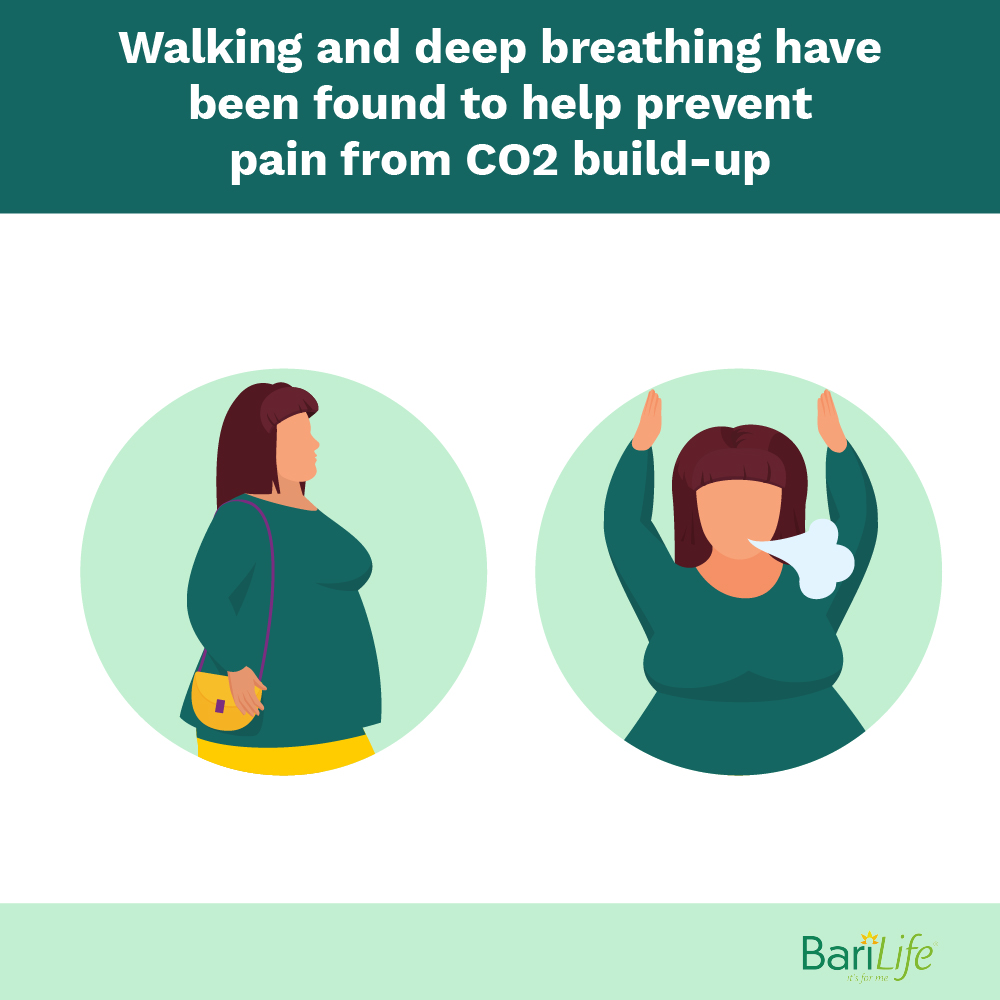
The remaining CO2 naturally collects on the left side of the abdomen which leads to the common complaint of pain in the left upper corner of the abdomen or the left shoulder. The best way to prevent this pain is to get up and walk as soon as possible following the procedure.
Walking increases the rate of absorption of CO2 and makes the gas move more. Deep breathing activity can also aid in pushing gas out as it places pressure on the abdominal cavity.
How long should you anticipate pain following surgery?
You should notice a significant improvement in pain in the first couple of weeks following surgery. It is vital that you get plenty of rest and do not participate in any excessive physical activity.
It is also important to follow your bariatric surgeons recommendations on medications and diet. Proper management of diet, medications, and physical activity will optimize your recovery.
Pain that may indicate severe complications
- Left shoulder pain
- Severe stomach pain
- Sharp burning pain below the breast bone
- Severe heartburn
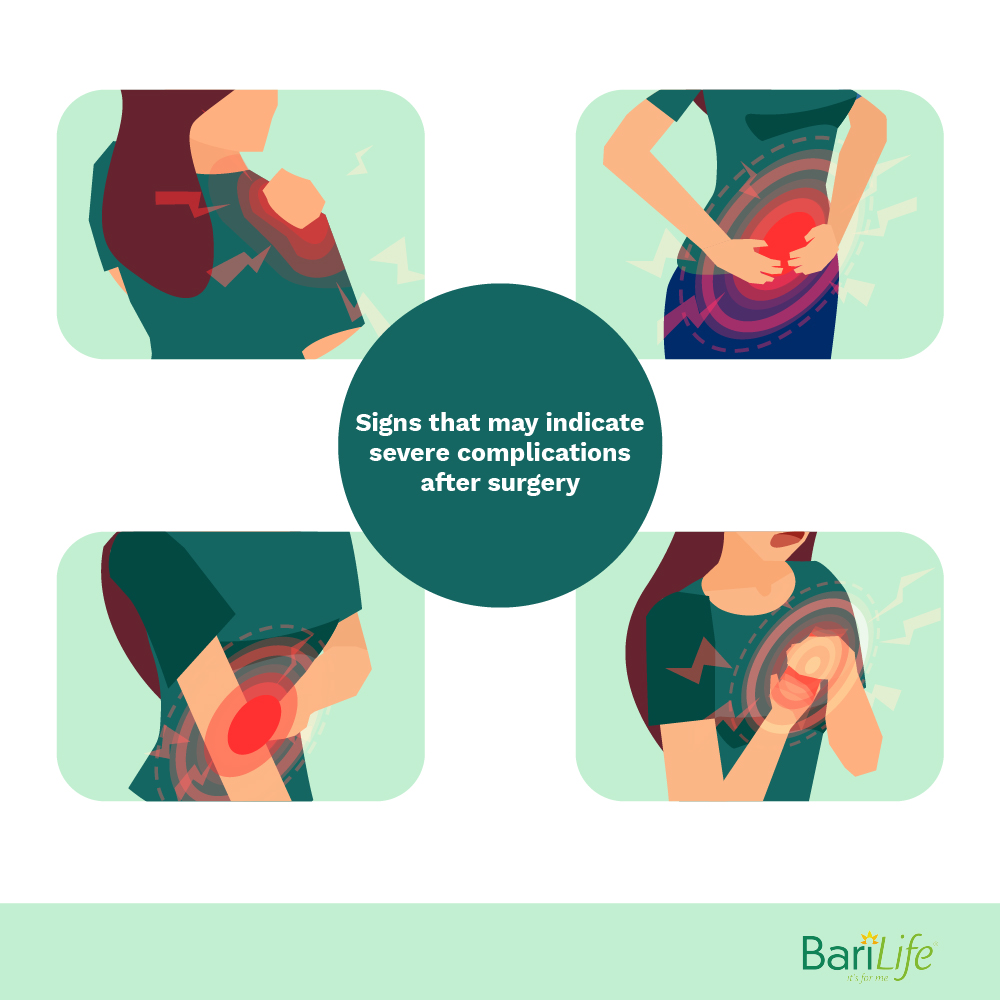
These severe symptoms, like left shoulder pain, may indicate severe complications like a leak, perforation, or fistula.
A retrospective study evaluating the presentation of gastric leaks following bariatric surgery found that 30% of patients with a leak experienced left shoulder pain and 20% experienced abdominal pain.
Anastomotic leaks following bariatric surgery are rare but can be severe if not detected early or properly treated. It is estimated that leaks occur in anywhere from 0.8-1.5% of patients.
Who is at a higher risk of developing a leak?
- Higher BMI
- Males
- Patients with a history of abdominal surgery
- Comorbidities
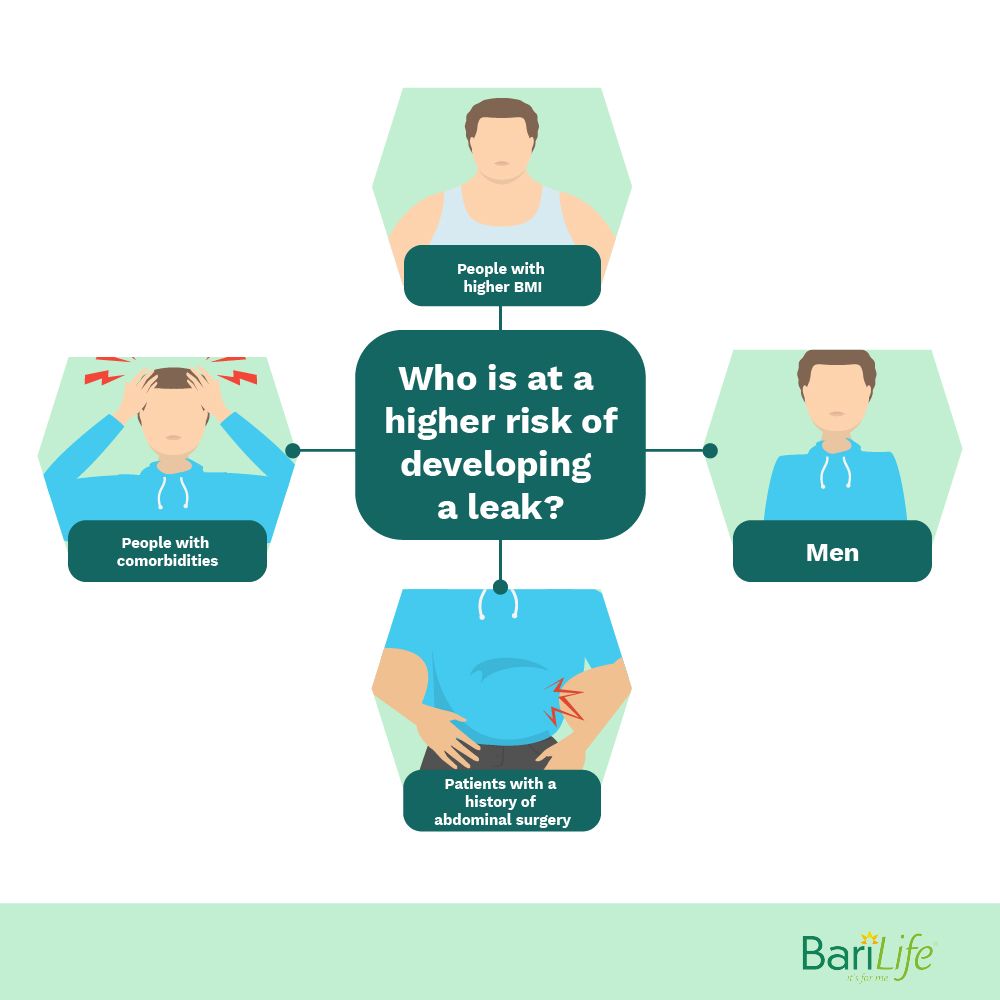
Overall the rate of severe complications is low. Examples of these complications include anastomotic/staple line leakage, stenosis or stricture of the anastomosis and pulmonary embolism, and they are estimated to occur in about 3% of the patients.
The symptoms listed above are related to pain but it is important to be aware of other symptoms that may indicate severe complications
These include but are not limited to:
- Excessive vomiting
- Inability to keep liquids down
- Rapid heart rate
- Fever
- Drainage from surgical wound
- Low blood pressure
- Decreased urine output
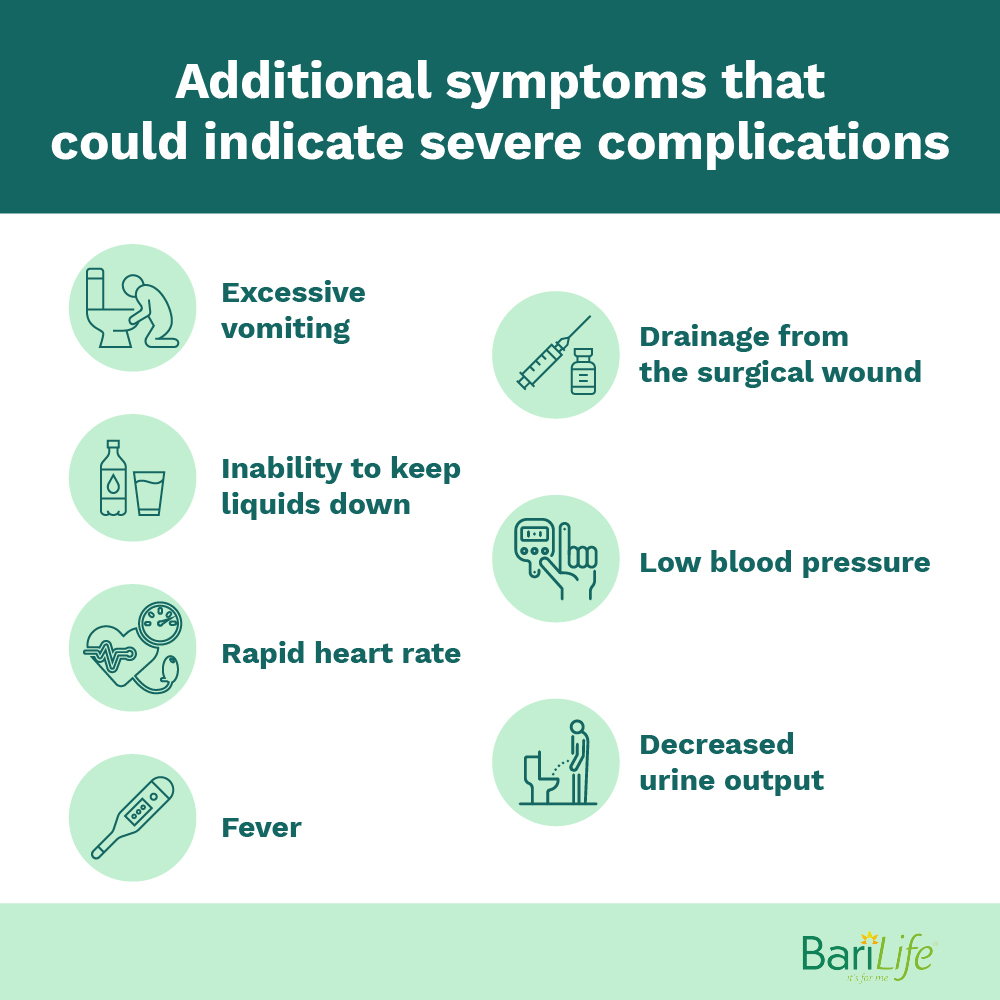
What should you do if you are experiencing severe pain or symptoms that may indicate a severe complication?
*If symptoms are severe or persistent you should contact your bariatric surgeon
It is very important to consult your bariatric surgeon over your primary care physician as bariatric surgeons are more familiar with complications related to gastric bypass.
Pain or discomfort is almost inevitable following surgery. It is important to evaluate the type of pain that you may be experiencing. Evaluate if the pain occurs following meals, or when you are sitting in certain positions.
Look to see if the pain is sharp, or cramp-like, or a burning sensation. Try to evaluate if the pain is mild or severe. Trust that you know your body and if you are experiencing severe symptoms or pain contact your bariatric surgeon.




Okay before the surgery I was 405 lbs the day of my surgery as 337 a couple of months three to be exact I was down to 295 and then a couple of weeks later I was down to 266 well from there I’m not sure our understanding but I know that I have my monthly and we always blow up when we have our monthly so I gained about 10 pounds and then it’s like every time I lose I gave it back so now instead of Mimi in 250 I’m 284 and don’t know what to do to get it off again or to get it started back to losing weight as well I’ve done everything I can I’m working out eating what I’m supposed to eat in the amount of what I’m supposed to eat I’m drinking I’m sippin all day I’m taking my vitamins I’m doing the shakes again because at one point they got me so sick I had to get off up take it most of my medication because I’m off half of them due to my health bed better I’m just not understand what more I can do so that I can start my read losing weight again
Hi Teresa,
First, a huge congrats on the weight loss you’ve achieved so far!! That’s amazing.
To get back on track it’s always good to start by writing down everything you’re eating and drinking and keeping a log of your calories, carbs, fats and protein. Do this for EVERYTHING. It may feel like overkill but it’s the only way to see what’s going on.
That’s the very first thing you need to do to get a visual on where something might be going awry. It’s pretty insane how easy it is to feel like you’re working your butt off but then one or two things throughout the day can push you over on your daily goals without it even feeling like it.
Once you’ve done that read these articles:
https://www.barilife.com/blog/get-back-to-basics-and-stop-weight-gain-after-bariatric-surgery/
https://www.barilife.com/blog/how-to-restart-weight-loss-after-gastric-bypass/
https://www.barilife.com/blog/gastric-sleeve-diet-after-one-year/
a month ago I did the surgery, my weight was 222 lbs and now I am 200 lbs. I have noticed a sharp pain the second week after the surgery occuring (sometimes) on the left side when I move or walk below the ribs, I do not think it is related to the stomach since I have been eating normally and no complication related to it. I think it is related to this reason mentioned above “Surgery often involves making an incision below the ribs to staple the rerouted intestines. During this process stretching occurs that can result in bruising of muscles and damage to nerves which can cause horrible pain on the left side following surgery.
This pain is usually felt below the ribs and lasts for a few weeks after the procedure. This pain may be reduced or relieved by changes in posture” the pain is not constant, it disapears few days than comes back if I streched my body or moved sudenly etc. what would you recommend me doing or taking to help me get rid of it ? and how long do you think it would last after surgery usually? thank you.
What a thorough article. Thanks !